| Home |

|
Thomas
M. Miner |
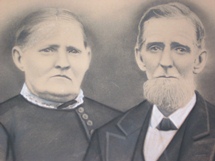 |
| Meletha and Thomas Miner |
Thomas M. Miner was born on March 24, 1831 in Madison Township, Perry County, OH, the son of Frederick and Jane (Richardson) Miner Sr. He was one of three brothers to serve in the Civil War, and while in the service of his nation was held as a prisoner of war.
With limited education and literacy, he did not know his own birthdate.
On Oct. 22, 1857, in Ilesboro, Hocking County, OH, Thomas married Maletha Ann Ogburn (1838-1918), sometimes spelled "Augburn." Justice of the peace Samuel Stultz performed the ceremony, which took place at the Ogburn home.
Maletha's parents were George and Hester (Milligan) Ogburn, who were Quakers and natives of Pennsylvania, and who had migrated to Perry County as children. The Ogburns first lived in Perry County, later moving to Hocking County and thence westward to Terre Haute, IN (where Maletha's mother died).
The Miners had at least eight children, of whom five lived to adulthood -- Harvey E. Miner, Elizabeth "Lizzie" Lytle, Frederick Miner, G. Wilbur "William G." Miner and Charles W. Miner.
During the Civil War, Thomas and his brother Andrew joined Company H of the 90th Ohio Volunteer Infantry, and their brother Frederick was a member of the 10th Ohio Cavalry.
At the time of enlistment, Thomas stood 5 feet, 11 inches tall and was considered "a sound able bodied man." While in the service, however, he suffered terribly from chronic diarrhea, hemorrhoids and back problems. He later said this was due to "being over-heated & much exhausted by a forced march from Lexington to Louisville, KY... [and] during said march, [I] was much deprived of water, & marched 100 miles in 86 hours, less about 16 hour sleep." The march occurred in September 1862.
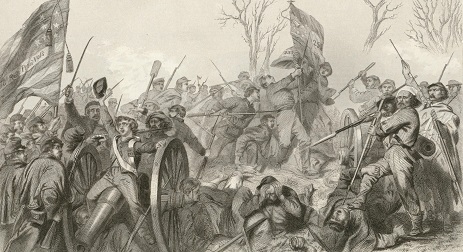 |
Above: fighting at Stones River on New Year's Eve 1862. Below: the section of the battlefield where Thomas fought and was captured. |
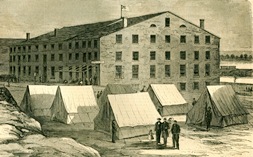 |
| Richmond's notorious Libby Prison |
The regiment's Captain, Nicholas F. Hitchcock, later wrote that during the forced march:
...many men were injured. Among the number Thomas M. Miner was injured by our exertion and after arriving at Louisville, Ky., and while there maneuvering said Miner fell out of Ranks by the wayside, exhausted & broken down.
On New Year's Eve 1862, Thomas and the 90th Ohio saw action in the very center of the fighting at Stones River near Murfreesboro, TN, along with Kentucky and Indiana regiments. They were positioned along the historic trace of McFadden's Lane between the "Slaughter Pen" and "Cotton Field," under the command of brigadier generals Charles Cruft and John M. Palmer.
Among Thomas' distant cousins also seeing battle action at Stones River were David Nesbit Miner of the 15th Ohio Infantry and Oliver Browning of the 51st Ohio.
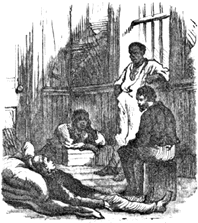 |
| POWs killing time at Libby Prison |
At some point, Thomas was taken prisoner. In his own words, he "was sent to Richmond, Va. and nine days in Prison at Libby." Libby Prison, a converted tobacco warehouse built of red brick, and seen above left, was a notoriously filthy and deadly prison, considered one of the Confederacy's worst.
One prisoner at Libby, a surgeon with the 12th WV Infantry, complained of having to sleep on bare floors, in front of open windows, with insufficient clothes or blankets. The men also were exposed to cold temperatures, dampness and germ-carrying insects from the nearby James River. Sanitation was non-existent -- prisoners relieved their bowels in the corners of their rooms.
Thomas eventually was released as part of a parole program at a hospital in Annapolis, MD. He then was ordered to Camp Chase, OH to recover. Later, in June 1863, he was released and returned to his regiment. He and his brother Andrew took part in the famous Atlanta Campaign, known today as "Sherman's March to the Sea," which devastated much of Georgia during the Union assault.
Thomas is known to have been treated by an Army physician in Bridgeport, AL. He was so ill that he was discharged there just before Christmas 1863. The regiment's surgeon, R.H. Tipton, wrote: "He is utterly unfit for any duty, and permanently so. He is excessively emaciated and evidently beyond hope of recovery."
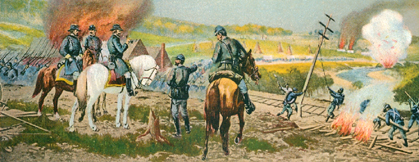 |
|
Sherman's Union Army burns fields and tear up railroad tracks in Georgia |
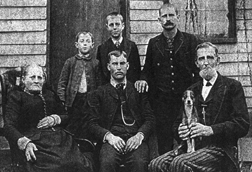 |
| Meletha and Thomas and sons |
Tragically, brother Andrew remained with the 90th Ohio, and died from the savage effects of diarrhea at Vining Station near Atlanta, GA on Aug. 2, 1864. He originally was buried at Vining Station, a stop along the Chattanooga and Atlanta Railroad. His remains later were reburied at the Marietta National Cemetery in Marietta, GA, where he now rests for eternity in Section I, Gravesite 9555.
When Thomas returned home to Sego from the Army in January 1864, he was broken in health, and in his own words, "[I] can only now make about a half hand or do about half as much as an able bodied man and at times say every two weeks cannot do any labor, [get] so weak and remains so for 2, 3 & 4 days & sometimes during that period of weakness [my] appetite is poor and cannot eat sufficient to gain strength."
The Miners' residence was a log cabin, where daughter Lizzie was born in 1865.
In 1871, when his father died, Thomas was to inherit a cow. However, "there being no cow on hand," he received $45 in cash instead. He also received $101.22 as his share of the remainder of the estate. In about 1876, they moved from the Sego area to nearby Bearfield Township Thomas worked as a mechanic and a farm laborer.
Seen here circa 1890, Maletha and Thomas pose with their four sons, standing left to right: Charles, Will and Harvey, with Fred seated. Note that Thomas holds a favorite pet dog.
 |
| Obituary, 1910 |
Thomas successfully pursued a pension from the federal government for his wartime disabilities. Of his illness, he wrote in 1879 that "for several years [I have] used old prescriptions given [me], and some patent medicines ... purchased and being poor [I have] tried to manage as best [I] could in [my] afflicted condition and avoided expense in treatment..."
In about 1880, they purchased a one-half acre tract at McLuney Station in nearby Harrison Township, from the trustees of the United Brethren in Christ Church. (The trustees at the time were James Conaway, James W. Shell and Royal H. Conaway.) That year, son Harvey was working locally as a coal miner, though his fate after that is unknown. The online booklet, A Brief History of Perry County, Ohio, says that "McLuney was platted and organized in 1855. It is the centre of a rich coal field, and mining is the principal business."
 |
| Obituary, 1910 |
In 1885, though tall, Thomas weighed only 128 lbs. After administering a medical examination that year to Thomas, his physician wrote:
He is thin, ... eyes and face are sunken, & muscles are small and soft. Abdomen is flat & dull & tender on pressure. His heart is feeble but not diseased organically. His lungs, liver, spleen & kidneys are normal. His tongue is fissured & red & his teeth are half gone.
When the federal government undertook a special census in 1890 of Civil War veterans and their widows, Thomas was listed as living in "McLuney or Deavertown" with no further comment about any wartime-caused disabilities.
In April 1896, they sold the McLuney Station farm to Wesley Russell. They were last known to be taxed in the township in 1898.
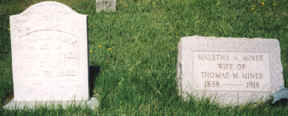 |
| Final resting place for Thomas (left) and Meletha at Lillydale Cemetery |
One of the few of our cousins of that generation to move east rather than west, they relocated in 1899 to Gallitzin Township, Cambria County, PA, to be near their daughter and son in law, Lizzie and John Lytle.
Thomas was blind in his final years, and suffered from hardening of the arteries and heart inflammation. After 52 years of marriage, Thomas passed away in Lilly, Cambria County on May 12, 1910.
To support herself financially, Maletha then obtained her husband's Civil War pension.
After eight years as a widow, she died on Feb. 5, 1918. They are buried together beside daughter Lizzie at Lillydale Cemetery in Cambria County.
Seen here today, Thomas' grave marker (at left) is faintly visible, while Maletha's is very legible.
The Lilly community was in the news on Christmas Day 2008 -- when an 1851 painting of an old local saw mill was published on the front page of Pittsburgh Post-Gazette. The work was painted by Alfred S. Wall and entitled "Old Saw Mill," and today is on display at the Westmoreland Museum of American Art in Greensburg, PA. Click to see the painting and news story.
| Copyright © 2001-2002, 2005-2006, 2008, 2019 Mark A. Miner. |
|
Prepared with assistance of the Miners' great-great-great grandson Craig Adams. Original painting of Sherman's March to the Sea from the Milwaukee Public Museum. |